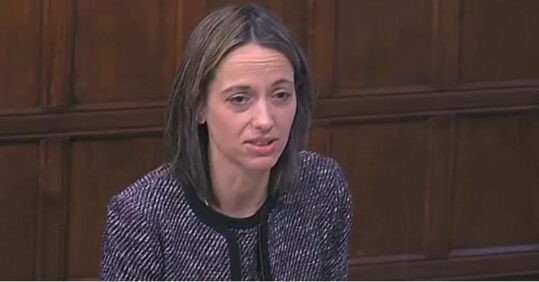Student nurses have furiously reacted to minister for care Helen Whately suggesting they were not ‘deemed to be providing a service’.
The comments came after student nurse Jessica Collins raised concerns that student nurses who studied between 2017 and 2020 had missed out on financial support in a letter to her local MP Tom Pursglove.
The bursary – which covered tuition fees and helped support living costs – was scrapped in 2017 and, although the Government has since introduced maintenance grants for student nurses, they only cover students starting this Autumn.
In a letter responding to Mr Pursglove, Ms Whatley said the Government had ‘no plans’ to backdate the new maintenance grants.
She also wrote: ‘Student nurses in training are supernumerary and are not deemed to be providing a service.
‘They are required to undertake 2,300 hours of clinical practice to learn skills necessary for entry to the workforce.
‘Whilst they may be performing limited clinical duties, this is under close supervision and they are not being paid to staff hospitals.’
Student nurses on placement are usually supernumerary, meaning they are not counted in staff numbers, but this did not apply to those on paid placements during the pandemic.
Related Article: Q&A: What do field specific standards for community nursing mean for me?
Nurses have reacted angrily on Twitter, with one calling Ms Whately’s response ‘sickening’ and another saying it had left her lost for words.
They pointed out that many student nurses have put themselves at risk by undertaking paid placements to help tackle Covid-19.
Ms Collins – who has also started a petition calling for tuition fees and student nurse debt to be abolished – also said on Twitter that the comments were ‘demoralising’.
Could I be involved in this communication? Given that the demoralising comments in your letter were DIRECTLY addressed to me?……An apology wouldn’t go amiss. I’ve never been so insulted, nor felt so protective of my peers and everything they stand for.
— The Student Nurse Mummy (@stnursemummy) June 21, 2020
I actually have no words for this. “Student Nurses are not deemed to be providing a service” – I would love to see this person work 1 shift as a student nurse and see how they feel then. #Disappointed #StudentNurses @PUNC14 @DHSCgovuk https://t.co/pC5HEc18eS
— Amy Sawyer StN (@puncamysawyer) June 20, 2020
I am sorry this was her reply. Sickening response. I’ve been qualified now for 8 years and being a student was hard. Working unsociable hrs, hardly ever supernumeray and working our arses off for very little. You guys have been amazing through this pandemic x
— Cait (@x_QPRFC_x) June 21, 2020
Related Article: £30million set aside to fund nurses in research positions
What a nasty piece of work Helen Whately is. My student nurse daughter has been working on a Covid ward for weeks with a lot of responsibility. She is so scared she may spread it she has moved out of our house to an Airbnb she can ill forward #nobursary #nhs
— wombatwoman (@jenniww) June 21, 2020
Newly qualified nurse Claire Carmichael told Nursing in Practice that Ms Whately’s letter was a ‘huge slap on the face for every student nurse right now’.
‘Student nurses are not and never will be supernumerary,’ she said.
Ms Carmichael added that her tasks as a student nurse including washing and dressing patients, helping at mealtimes, giving out medication and undertaking wound management.
She continued: ‘Shifts were long. You didn’t get a say in what hours you did. If you were on nights, you were on nights, despite not getting paid.
‘Student nurses now, with the removal of the bursary, are technically paying themselves to work these 40-hour week placements.’
Related Article: Bringing the views of student nurses into general practice: Learning disability
Minister for care Helen Whately responded to the nurses’ reaction saying: ‘The whole country is grateful to student nurses for their heroic work on the NHS frontline during this unprecedented global pandemic.
‘Supernumerary status for student nurses is a technical definition created to ensure they have the space and time to learn, and it is widely supported across the nursing profession.
‘There is a strong financial aid package for nurses and going forwards we have introduced even further support for nursing, midwifery and many allied health profession students consisting of a £5,000 to £8,000 grant to help with maintenance and associated study costs, which does not need to be paid back.’







